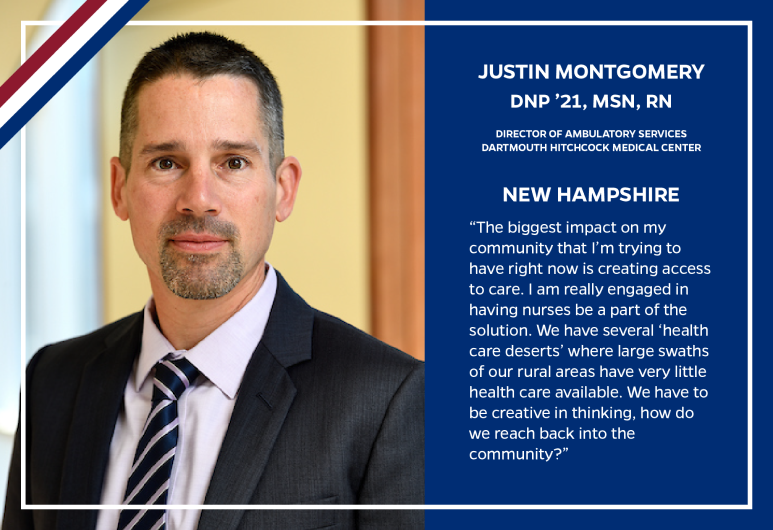There are mountains, skiing, hiking, and biking trails aplenty in the picturesque state of New Hampshire. There all also deserts—at least when it comes to health care, explains Justin Montgomery, DNP, APRN, director of ambulatory services at Dartmouth Hitchcock Medical Center in Lebanon, a small city close to Vermont and surrounded by sparsely populated communities.
People flock to Dartmouth Hitchcock—the state’s only academic medical center—for its specialty services, like neurosurgery, cardiovascular, orthopedic, operative-perioperative services, ICU specialists, and many others. Those who can’t get in are the reason Montgomery and his team keep pushing.
“The biggest impact on my community that I’m trying to have right now is creating access to care. I am really engaged in having nurses be a part of the solution,” says Montgomery, a graduate of the DNP Executive program. “We have several ‘health care deserts’ where large swaths of our rural areas have very little health care available. We have to be creative in thinking, how do we reach back into the community?”
“We have so many patients who need to get in to see us,” he says. “Our strategy is aligning our ambulatory nursing and practice with the National Academy of Sciences, Engineering, and Medicine’s Future of Nursing Report from 2020. A lot of that pointed to nurses to addressing things like social determinants of health, health equity, and—for us—it’s rural health equity.”
It’s a challenge. “We deal like everyone else with significant staffing shortages. It’s not always the easiest thing to get people to want to move up to a small town like this … unless you really like skiing, and you really like hiking, and you really like the outdoors”—for Montgomery, who probably just hopped off his gravel bike after a daily commute, that would be check, check, and check—”there isn’t a huge draw to come up here if you’re looking for city options.” If you do, you need to be clear with yourself on why.
“I have recently worked with a number of people that I either supervise or are colleagues who are struggling. I was challenging them to say, ‘Why are you in leadership? Why are you doing the things that you’re doing?’ Because we all know that when you get into some of the challenging times that we’re in, if you’re not really clear on why you’re doing this, then it becomes really hard to sustain it.”
Same with DNP programs.
“Everybody has the ability to go into the same evidence-based libraries. Anyone can go into how you can do translation science,” Montgomery says. “But when you’re surrounded by really smart people pursuing excellence in their own way, it inspires you. Not only did it inspire me then, but I’m actually still connected to a number of people who I went to school with. We just came together to work on a text that was going out for primary care nurse practitioners—we’re were trying to figure out, who’s going to edit some of these chapters? And it was really easy. You’re surrounded in a class by 40 really bright people who can do this. That is such a difference maker.”
And ideal for a nurse with a determination to lead, and to do it well.
“When it comes to leadership, and when it comes to the skills you need in leadership, you can be born with some of the traits and characteristics that will make you successful. You might be charismatic, you could be empathetic, you could be strategic. You also have to put a lot of time into learning those additional skills: how do you get performance feedback, coach for success, and all the other things.”
So, why is he doing this? “I think I’m in my position because this is sort of what I was called to do. I came to recognize that I did have some of those same skills that were necessary to be a good leader: naturally empathetic, really passionate about the work that I do. I care about the people I work with. And I had a really endless curiosity about learning the additional skills to do it well.”
He has no plans to stop, or to move on. There are few pastures greener than New Hampshire, after all.

“I really love the work that I’m doing. And it’s amazing working in an academic center like Dartmouth-Hitchcock Medical Center. You’re surrounded by all these smart people who are fun to work with as well. I have pictured myself in different locations and thought about living in different settings. But It feels like I was called to do the work that I’m doing and I love the area that I’m doing it in, so I can’t see working in a different location.” — Steve St. Angelo
Click here to learn more about the programs at the Johns Hopkins School of Nursing.
Go to unitedstatesofnursing.org to see more stories in The United States of Nursing.
